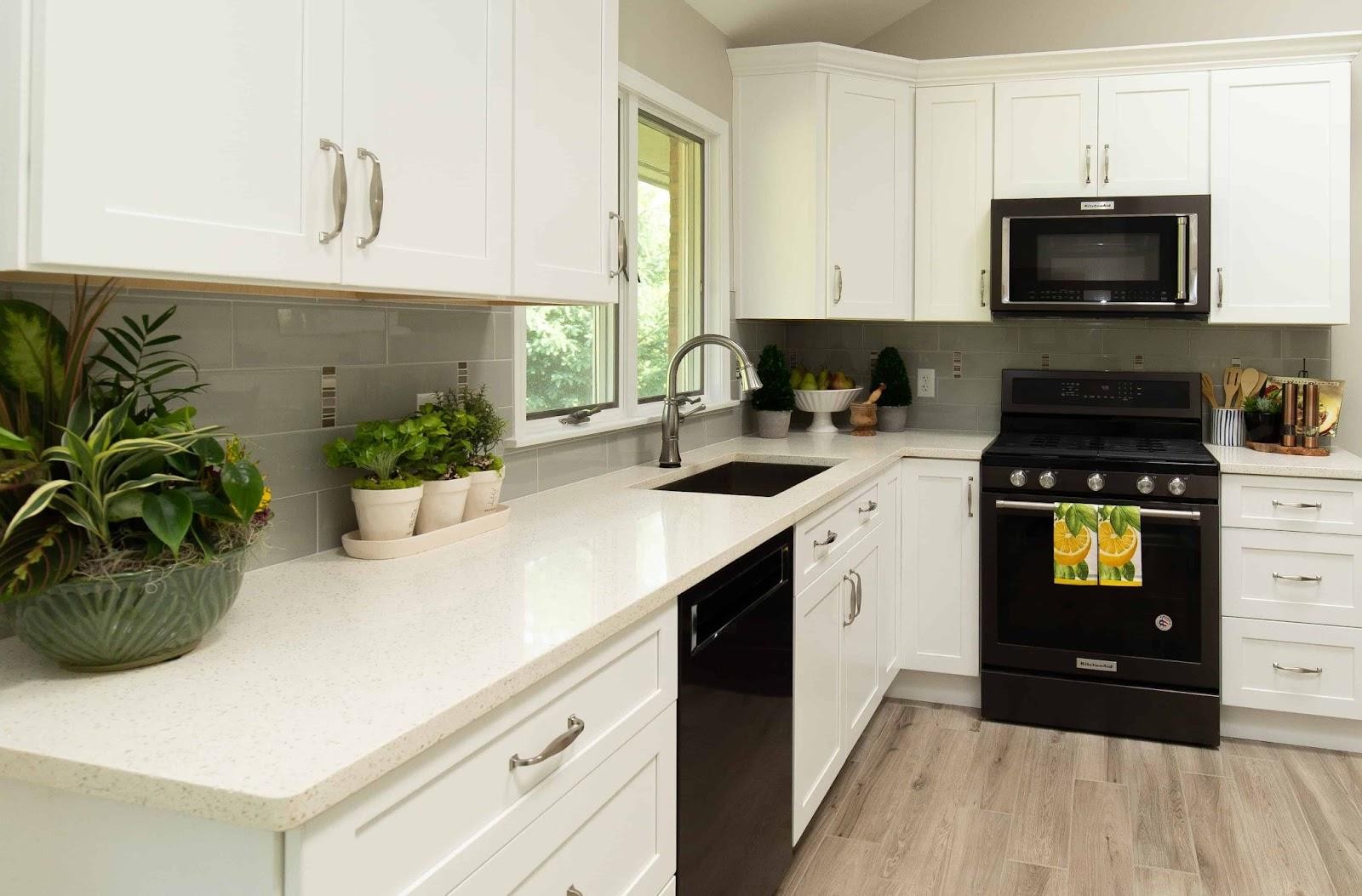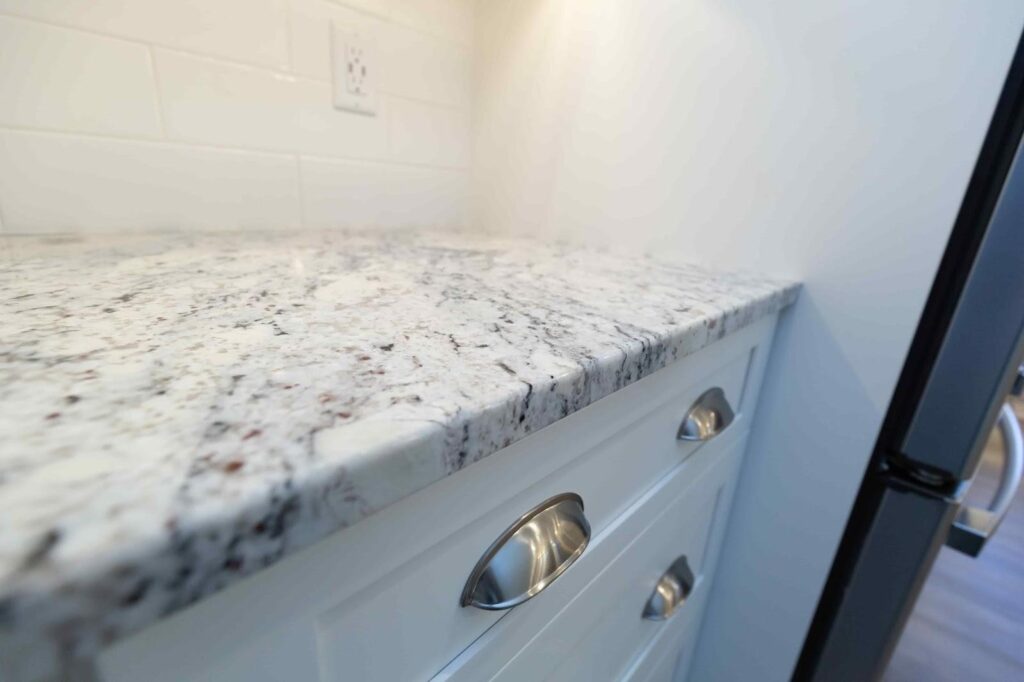You’ve probably heard that granite is tougher, or that quartz countertops are easier to maintain. But when it comes to choosing the right kitchen countertop, the facts aren’t always what they seem.
At Distinctive Surfaces, we’ve seen firsthand how those assumptions hold up or fall apart once real life kicks in. Nearly ten years in the business has shown us more than enough.
In this guide, we break down granite and quartz where it matters: durability, heat, stains, and upkeep—so you can make the smart call.
If you’re still figuring out how to choose the right material for your space, our guide on selecting the best kitchen countertop can help.
1. Durability Showdown — How Do Granite and Quartz Hold Up Over Time
If you’re serious about your kitchen lasting, durability isn’t just a nice-to-have—it’s the whole game. A countertop might look great on day one, but how will it hold up five years in? That’s what this section answers.
Scratch & Impact Resistance
Granite is a very hard, natural material—an igneous rock formed deep in the earth. It’s built to take a beating. You can chop vegetables, slide pans, and stack groceries on a well-fabricated granite countertop without worrying about surface damage. That’s not marketing talk—it’s geology. The minerals in granite make it one of the most scratch-resistant options available.
Now compare that to engineered quartz. It’s also tough, made from crushed quartz crystals mixed with resin to form a hard slab. But here’s the thing: quartz countertops can be more vulnerable to chipping, especially around thin edges or overhangs. It’s not about strength alone—it’s how the material responds under real conditions, like accidental bumps or dropped cookware.
Curious how granite holds up in the busiest kitchens? Here’s a closer look at how long granite countertops really last in high-traffic homes.
We’re not done testing durability, though. What happens when heat gets involved? That’s up next—and it’s a real separator.
Heat Resistance
Granite has one big advantage no one argues with: it’s heat-resistant. You can mistakenly set a hot pan on a granite surface without worrying about it cracking or discoloring immediately. That’s a huge plus for anyone who cooks often or forgets to grab a trivet. However, this shouldn’t be a habit, as heat can damage any material.
Quartz, on the other hand, is engineered with resin. And resin has a heat limit. If you place a hot pot or pan straight onto a quartz countertop, you might leave a permanent mark or cause warping. For occasional use, it might not be a deal-breaker, but if your kitchen sees daily action, that risk adds up.
And keep in mind: durability isn’t just about scratches and heat. It’s also about stains, the silent killer of beautiful countertops. Let’s break that down next.
Stain Resistance & Porosity
Here’s where things flip. Granite is a porous material. Meaning if it’s not sealed properly, spills can seep in and leave behind stains. Wine, oil, and juice, once they get into the stone, they’re hard to remove. That said, a well-sealed granite countertop holds its own. The key is to reseal it as often as your fabricator suggests, depending on use.
Quartz is non-porous by design. Because it’s manmade, it’s engineered to resist stains without any sealing required. That means your coffee spill at 7 a.m. won’t turn into a headache if you wipe it up when you see it with soap and water, and you’re good.
But this isn’t just about stains. It’s about what kind of maintenance commitment you’re making. And that leads us straight into the next piece of the puzzle: cost and upkeep, which we’ll tackle in the next section.
2. Cost & Maintenance — What You’re Really Signing Up For

A kitchen countertop is more than a purchase—it’s a long-term relationship. And like any relationship, it’s not just about how it starts, but how it holds up over time. So, what does it take to own and care for granite and quartz, from the initial investment to the day-to-day reality?
Cost Per Square Foot
When it comes to granite or quartz, pricing isn’t one-size-fits-all. Both can be on the higher or lower end of the spectrum, depending on factors like slab rarity, color, thickness, edge profile, and the complexity of the fabrication and installation.
Granite slabs with more exotic patterns or rare colors often come at a premium. Likewise, certain quartz slabs, especially those mimicking marble or with custom pigments, can be just as much of an investment. Even the material’s source or the distance it needs to be shipped can affect the cost.
Here’s the smarter way to think about it: don’t just compare the sticker price. As we discussed earlier, heat resistance, staining, and sealing all factor into long-term value. What looks like a better deal upfront may require more upkeep or vice versa. Cost isn’t just about dollars; it’s about fit.
Want to dig deeper into what drives pricing? These are the key factors that determine the cost of granite countertops in Albany.
Maintenance Realities
This is where daily life comes into play.
Granite is a porous material, which means it needs sealing to prevent stains. A reseal every few years is typical for most kitchens, depending on how heavily the space is used. Some homeowners are fine with that. For others, it’s a dealbreaker.
Quartz, as an engineered stone, is nonporous. No sealing required. Wipe it with soap and water, and you’re done. That’s part of why quartz countertops appeal to busy households, vacation homes, or rental properties where low maintenance is key.
And remember: we already covered how porosity affects stain resistance. Maintenance is simply the long-term result of those physical properties. Choose the one that fits your lifestyle, not just your aesthetic.
Quartz isn’t just for kitchens. It’s also a great choice for bathrooms. Here’s what to know about using quartz for vanities in Albany.
3. Style, Patterns, and Aesthetics — What It Looks Like in Your Home
A kitchen countertop doesn’t just need to hold up—it needs to look right. Whether you’re remodeling a cozy family kitchen or designing a modern open-plan space, the material you choose sets the tone. This section breaks down how granite and quartz differ in look, feel, and flexibility—and how those differences show up in your space.
Natural Variation vs Engineered Consistency
If you want a one-of-a-kind surface, granite is a natural stone countertop with true personality. Each slab is cut from a quarry, shaped by time and pressure, and filled with complex minerals that give it depth and movement.
No two granite slabs are ever the same—some swirl with bold contrasts, others flow in subtle waves. If you like the idea of something nature-made and unrepeatable, this is where granite shines.
Quartz is actually designed for consistency. Made from crushed quartz crystals, resin, and added pigment, engineered quartz countertops can be created in controlled patterns and colors. That means you can get the exact look you want—whether that’s a clean, modern finish or something that mimics the look of natural stone like marble.
And yes, this design flexibility can influence the cost. Some quartz slabs with intricate, pigment-heavy designs may be priced above standard granite options. But again, cost alone doesn’t tell the full story.
What Fits Your Space?
Granite colors often lean bold, featuring deep blacks, rich browns, and icy whites with heavy veining. This is great if you want your countertop to make a statement or bring natural contrast to your kitchen. The texture and finish can also vary from slab to slab, adding even more visual interest.
Quartz countertop colors, by contrast, give you more control. Soft greys, matte whites, taupes with subtle veins—you can match or complement any cabinet style, wall color, or flooring. Because it’s engineered, quartz makes it easy to build a cohesive, polished look, especially in minimalist or transitional spaces.
But style should never be separated from function. As we saw in earlier sections, the durability and maintenance differences between these two materials shape how that beauty holds up after years of spills, heat, and day-to-day use.
Ready to Start Your Next Project?
Still deciding between granite and quartz countertops? At Distinctive Surfaces, we help you choose the right fit. Not just for your kitchen, but for your lifestyle. Stop by our Round Lake showroom or schedule a no-pressure consultation with our expert team.
If you’re ready to move forward, here’s a step-by-step guide on hiring the right granite countertop fabricator.
FAQs
Is granite or quartz better for kitchen countertops?
Granite and quartz kitchen countertops each offer strengths. Granite is more heat-resistant and unique. Quartz is lower-maintenance and more consistent. The better choice depends on how you use your kitchen and what look you want to create.
Can you put hot pots and pans on quartz countertops?
You should not place hot pots or pans directly on quartz countertops. Quartz is made with resin, which can warp or discolor under heat. Use a trivet or pad to protect your surface. In fact, don’t place hot pots on any countertop surface.
Does granite stain easily in kitchen use?
Granite countertops can stain easily if not sealed, since granite is a porous material. When properly sealed and maintained, most spills, including wine and oil, won’t penetrate quickly or leave a mark on the surface, as long as you wipe up as soon as you notice it.
Do quartz countertops need to be sealed?
Quartz is engineered to be nonporous, so it does not require sealing. Unlike granite countertops, quartz resists stains naturally and only needs regular cleaning with soap and water, no additional protection needed.
Which lasts longer: granite or quartz kitchen countertops?
Both granite and quartz countertops are long-lasting when maintained correctly. Granite may handle heat better, while quartz resists stains and doesn’t need sealing. Their longevity depends more on care than on material.
What costs more: granite or quartz countertops per square foot?
The cost of granite or quartz per square foot varies based on color, grade, finish, and fabrication. Either can be affordable or high-end, depending on your choices. Price should align with design and function needs.
Are granite countertops going out of style?
No, granite countertops are not out of style. They remain popular for their natural beauty and variety of colors. Each slab of granite is unique, making it ideal for statement kitchens with organic character.
Do quartz kitchen countertops scratch easily?
Quartz kitchen countertops are durable but not scratch-proof. They resist daily wear but can chip or scratch under force, especially on edges. Avoid dragging sharp objects to keep surfaces in top shape.
What’s the difference between quartz and granite countertops?
Granite is a natural stone cut from quarries; quartz is engineered using crushed stone, resin, and pigment. Granite handles heat better. Quartz resists stains and requires less maintenance. Each has a distinct look and feel.

